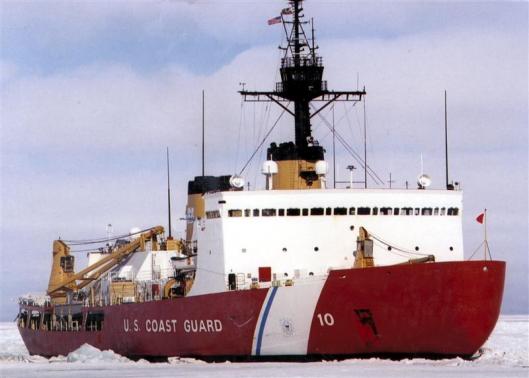U.S. breaker to help Russian, Chinese ships stuck in Antarctic ice
Date: 06-Jan-14
Country: INTERNATIONAL
Author: Peter Cooney

Polar Bear, the U.S. Coast Guard icebreaker, works the ice channel
near McMurdo, Antarctica in this handout photo taken January 10,
2002.
Photo: U.S. Coast Guard/Rob Rothway
The Polar Star is responding to a request for assistance from Australian authorities as well as from the Russian and Chinese governments, the Coast Guard statement said.
"The U.S. Coast Guard stands ready to respond to Australia's request," Coast Guard Pacific Area Commander Vice Admiral Paul Zukunft said. "Our highest priority is safety of life at sea, which is why we are assisting in breaking a navigational path for both of these vessels."
Coast Guard Chief Warrant Officer Allyson Conroy said the Polar Star was expected to arrive on the scene on January 12 and take two to three days to complete its mission.
"You're looking at the Antarctic, which is a challenge in itself. You have weather and you have ice," Conroy said in a phone interview. "But our crews are very well trained and we expect to be successful in this mission."
A Chinese icebreaker that helped rescue 52 passengers from a Russian ship stranded in Antarctic ice found itself stuck in heavy ice on Friday.
A helicopter from the Snow Dragon ferried the passengers from the stranded Russian ship to an Australian icebreaker late on Thursday. The Chinese vessel now had concerns about its own ability to move through heavy ice, the Australian Maritime Safety Authority said.
The Russian-owned research ship, Akademik Shokalskiy, left New Zealand on November 28 to commemorate the 100th anniversary of an Antarctic journey led by Australian explorer Douglas Mawson.
It became trapped on December 24, 100 nautical miles east of French Antarctic station Dumont d'Urville and about 1,500 nautical miles south of Tasmania.
During their time on the ice, passengers amused themselves with movies, classes in knot tying, languages, yoga and photography, and rang in the New Year with dinner, drinks and a song their adventure.
The Coast Guard's Polar Star is 399 feet long with a maximum speed of 18 knots. It can continuously break 6 feet of ice at three knots, and can break 21 feet of ice backing and ramming, the Coast Guard said.
The Polar Star has cut short its planned stop in Sydney to conduct the mission. It left its home port of Seattle in early December on "Operation Deep Freeze," to break a channel through the sea ice of McMurdo Sound in Antarctica to resupply and refuel the U.S. Antarctic Program's McMurdo Station on Ross Island.
(Editing by James Dalgleish and Diane Craft)
![]()
© Thomson Reuters 2014 All rights reserved